A new cheaper alternative to the cancelled HS2 northern leg has been proposed by a consortium backed by the mayors of Greater Manchester and the West Midlands.
The 50-mile-long railway would also be slower than HS2, but still deliver the majority of the benefits, according to a new report.
The Opportunity Through Connectivity document has been put together by a consortium of consultants and construction specialists. It follows a major review chaired by former non-executive chairman of HS2 Sir David Higgins and led by consultancy firm Arup.
The report backs construction of a new line - the Midlands-North West Rail Link (MNWRL) - running from Handsacre (near Lichfield) through to Crewe and then onto High Legh near Manchester Airport. The new line would link HS2 Phase 1 with the proposed Northern Powerhouse Rail project.
According to the report, the new line, which would follow a similar route to the cancelled HS2 Phase 2a, would deliver “roughly 85% of the benefits” at around 60%-75% of the cost. MNWRL would be built using ballasted track, rather than more expensive concrete slab track.
The review found that although services would be slower than if HS2 had been built, journeys between London and Manchester via the MNWRL would be only 15 minutes longer, which (the report maintains) would still be 30 minutes quicker than today.
Analysis also reveals a new rail link could boost growth by adding up to £70 billion annually to the West Midlands and Greater Manchester economies. In what it calls an “annual growth bonus’, the report suggests that it could provide a yield of up to £24bn in revenue per year for the Exchequer.
In the report’s foreword, Higgins said: “A high-capacity, resilient passenger and freight rail network, linking major economic centres in this country, will be essential for long-term economic growth in the United Kingdom - enabling new housing, building new skills, driving innovation, and enhancing social mobility.”
The northern leg of HS2 was scrapped by then-Prime Minister Rishi Sunak at last year’s Conservative Party conference in Manchester. Since then, the safeguarding of the route from Lichfield to Crewe has been lifted, although it’s understood that none of the properties purchased by HS2 Ltd has yet been sold.
At a press conference to launch the report, Greater Manchester Mayor Andy Burnham made a series of recommendations for the government - including reinstating the safeguarding and maintaining the land ownership on the former HS2 route.
He also called for the formation of a steering group involving the government, the two Combined Authorities in Greater Manchester and the West Midlands, and the private sector, to continue the work on the proposed line.
Burnham also suggested that ministers should use this month’s Global Investment Summit to begin to engage with investors with an interest in helping to fund the new line.
He said: “There’s a big opportunity coming. Why would we not put forward our opportunity to help Britain with a major piece of infrastructure? It’s an opportunity that we shouldn’t miss.”
The report also calls on the government to undertake further financial, commercial and economic analysis to develop a more detailed investment prospectus for the private sector, and to optimise value for money for the public sector.
Both Burnham and West Midlands Mayor Richard Parker are looking for the plan to be included in the forthcoming Budget. They say this would ensure that the feasibility study could start immediately.
While no costings for the proposed line were included in the report, it did state that the proposal would “save the taxpayer £2 billion on costs” from the HS2 Phase 2 cancellation, through re-using much of the land, powers and design work already secured through public funds. The team also found that a new line was the only suitable option for attracting private finance.
The review found that ‘doing nothing’ on the Birmingham to Manchester corridor was not a viable option, from either economic or operational perspectives. The team assessed various options, which also included bare minimum upgrades and a new rail link.
This is the second major study within a matter of months that has backed the need for a new line linking the Midlands and the North West.
In May (RAIL 1010), former Virgin Trains Chief Operating Officer and Network Rail board member Chris Gibb launched an independent study calling for an extension to Northern Powerhouse Rail south to Lichfield, again along the route of HS2 Phase 2a. He also suggested repurposing the Class 390 Pendolino tilting trains to run on HS2 when it opens.
Gibb’s detailed proposal highlighted issues related to train length and seating capacity on services to Manchester and Scotland. His suggestions have been seen as an interim solution aimed at maximising the impact of HS2 Phase 1, ahead of further investment in high-speed infrastructure post the 2040s.
Gibb has welcomed the latest report and its recommendations. He said: “Providing more seat capacity on the London to Manchester route is key to providing for continuing growth between these cities, and the new route would provide for longer and faster trains in due course. I hope progress will be made with this project as part of the planned renewal of the Crewe layout and Northern Powerhouse Rail in the next decade.”
However, he continued: “This doesn’t remove the need for an ambitious interim service plan for the period 2030 to 2042 to make the most of HS2 Phase 1 when it opens for passengers, and immediately release seat and track capacity on the West Coast Main Line for more suburban passengers and freight traffic. I have tabled such a proposal, which the DfT and others are considering.”
Both reports appear to echo the findings of the recently published Juergen Maier review, commissioned by the Labour Party on Rail and Urban Transport.
It backed the case for connecting the Midlands and the North West with a new line, warning that the M6 corridor would collapse within a decade if no action was taken (RAIL 1017).
Following the launch of the latest report, a Department for Transport spokesperson said: “We are currently reviewing the position we have inherited on HS2 and will set out the next steps in due course.”
The DfT added: “Transport is an essential part of our mission to rebuild Britain, and we are absolutely committed to improving rail connectivity across the North and working with devolved leaders, as set out in the government’s manifesto.”

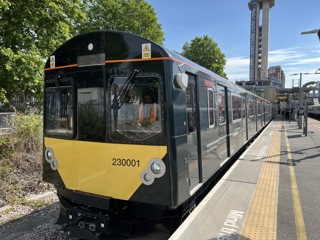
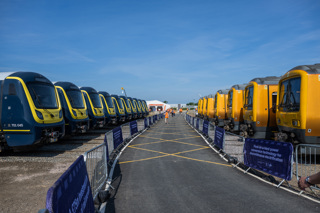
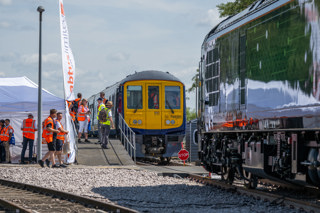
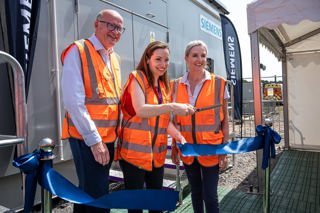









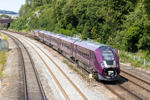


Login to comment
Comments
No comments have been made yet.